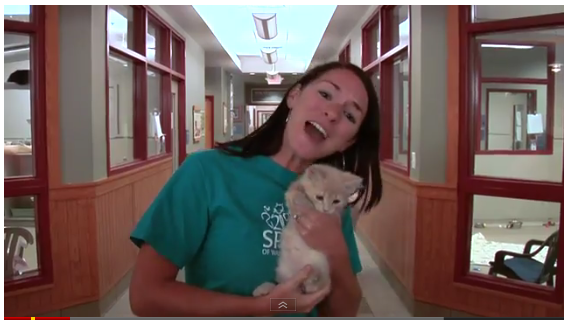The other day my friend Ann, a fellow volunteer, told me about an acquaintance of hers. She said the acquaintance was very interested in adopting a small-breed dog, but she couldn’t bear the idea of having to actually set foot in the shelter. Ann feared the woman might end up with a pet store puppy or buying from a breeder, simply because the point of purchase wouldn’t be as depressing.
My friend Nina says the ultimate disconnect is when people tell her they could never work at a shelter because they love animals “too much.” Funny, we never hear people say they could never be an oncologist because they love humans too much. You may not love hanging out at hospitals, but if it means saving a life, of course you go.
There’s a movement these days to change the perception — and the actual experience — of what it means to visit an animal shelter. At the Humane Society of Silicon Valley in Northern California, you can host your next business meeting in one of their conference rooms. At the Santa Fe, New Mexico, shelter they hold “critter camp” for kids during the summer. This new breed of animal shelter — that is, a place you genuinely want to spend time — might be epitomized in a video created by the SPCA of Wake County.
Invitingly modern facility? Check. Smiling, energetic staff? Check. Adorable puppy faces? Yeah, it’s all there, and they couldn’t have picked a song with more appropriate lyrics.
Creating that sort of environment takes vision, initiative, and a heck of a lot of money. In this economy, especially, I don’t expect these new models to crop up like so many Starbucks. But the fact that campuses like these exist at all is important.
The shelter where I go looks nothing like the one in the video. The building, to put it kindly, isn’t pretty, and the aroma from the sewage plant next door doesn’t help. But the staff genuinely gets along and jokes with each other. The dogs are walked regularly or taken to outdoor pens where they can run off leash and wrestle amongst themselves. The animals are treated with compassion and respect. And while those might not be the first things you notice when you get there, the place (as shelters go) is somehow uplifting. Not every single moment, of course, but in general, there’s light to be found. When taking into account the things that count, our shelter is one of the very good ones.
I’m not suggesting that’s the norm, and I know facilities like the one in Silicon Valley are infinitely rarer. The fact is, plenty of animal shelters across the country aren’t just depressing, they are absolutely heartbreaking. But please don’t make that a reason not to go. The animals there can spend weeks, if not months, waiting for rescue. You only need spend a few minutes. And the sadness you feel walking in hardly registers compared to the joy felt walking someone out.
This shift away from depressing utilitarian compounds, toward inviting “adoption campuses,” may be happening slowly, but we are moving in the right direction. Maybe sharing this video can provide inspiration and help prove to donors, city planners, and elected officials that it can be done. But in the meantime, please don’t kid yourself. Turning away from your local shelter won’t make it ok for the animals who don’t have that option.
PS. Thank you Mary, Jenna, Lisa, and Linda for your support yesterday…and every day.










